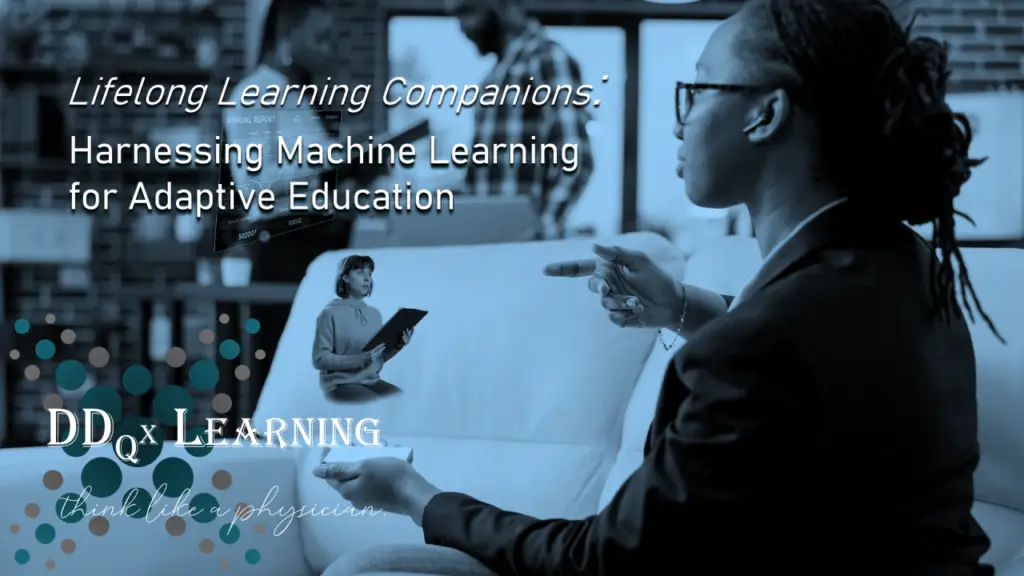
Lifelong Learning Companions: Harnessing Machine Learning for Adaptive Education
Inspired by my recent reading of The Potentialist: Your Future in the New Reality of the Next Thirty Years by Ben Lytle, I’ve decided to harness the power of storytelling and begin this article through the lens of a future user of machine learning technology.
Meet Mia.
She wakes up to a gentle voice reminding her that her online seminar in Creative Writing starts in 30 minutes. As she’s brushing her teeth, her AI assistant – an advanced machine learning-driven entity, we’ll call it ‘Aimee’ – quickly revises the main points of her last lesson, projecting them on the bathroom mirror.
Mia is not a school student; she is a successful architect. Her lifelong learning companion, Aimee, has been with her since her early school years, continuously adapting to her evolving learning needs and interests. Twenty years ago, Mia decided to learn creative writing to pen down her architectural experiences in a blog. Now here she is, effortlessly balancing her profession and passion, thanks to Aimee’s meticulous guidance.
Aimee is much more than a simple AI assistant. It is an adaptive learning platform that understands Mia’s unique learning style, identifies her strengths and weaknesses, and provides personalized educational content accordingly. The AI tutor has not only helped Mia excel academically, but it’s also been instrumental in her professional development, suggesting courses and skills pertinent to her evolving career needs.
Aimee’s role extends beyond Mia. As she enters her twilight years, her accumulated wisdom, experiences, and insights will not vanish. Instead, Aimee will distill these valuable learnings and pass them on to the next generation of learners, preserving her legacy in a profoundly personal way.
Intrigued by Mia’s story? Let’s delve deeper into how advances in machine learning are creating an unprecedented revolution in education, shaping the concept of lifelong learning companions for a digital future.
Machine Learning (ML), a subset of Artificial Intelligence, presents a wealth of opportunities to revolutionize the field of education. One such prospect lies in the development of adaptive learning platforms. These platforms, underpinned by ML algorithms, have the potential to personalize education, catering to individual students’ needs, thereby optimizing their learning experiences. Coupled with the concept of ‘lifelong learning,’ we stand on the precipice of a significant educational evolution in our digital world.
Adaptive learning platforms use ML algorithms to analyze a wealth of data about a student’s performance and learning style. They observe patterns in how a student interacts with the material, such as the time they spend on a problem, the approach they take to solve it, and where they succeed or struggle. By recognizing these patterns, the platform can tailor educational content to meet each learner’s unique needs. In essence, it provides a personalized roadmap for learners, highlighting areas of strength and weakness, and adapting in real-time to guide them through their educational journey.
But what if we extend the concept of adaptive learning beyond the walls of a school or the timeline of a degree? This is where the concept of a ‘lifelong learning companion’ comes into play.
Imagine an AI-powered tutor that evolves with you throughout your life. It would begin in your early years of learning, adapting and growing with you, understanding your unique learning style, and providing guidance at every stage of your education. As you progress, it could recommend courses, resources, and learning strategies tailored to your specific goals, whether they are career-oriented, personal interest-driven, or a blend of both.
In a rapidly changing digital world where new skills are continually needed, this companion could help navigate your lifelong learning journey. It could alert you to emerging trends and skills in your field of interest or work, suggest micro-courses to keep you updated, or even assist you in switching career paths by identifying transferable skills and knowledge gaps.
Moreover, your lifelong learning companion wouldn’t necessarily retire when you do. It could take on a legacy role, passing on the distilled essence of your knowledge and experiences to your successors, family members, or anyone interested in learning from your life’s work and insights. Imagine the next generation benefiting from personalized advice that encompasses not just the world’s knowledge, but your individual wisdom and experiences.
In conclusion, as ML continues to advance, its potential in the realm of education is limitless. By fostering adaptive learning platforms and envisioning lifelong learning companions, we have the opportunity to revolutionize education in ways that are more personalized, effective, and enduring than ever before.
